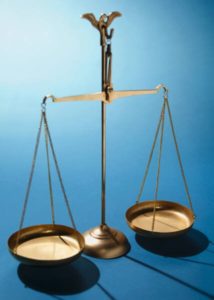
Shareholder, Officer Status Not Required To Pierce Corporate Veil
Sharp Thinking
Thinking
No. 113 Perspectives on Developments in the Law from The Sharp Law Firm, P.C. April 2014
Shareholder, Officer Status Not
Required To Pierce Corporate Veil
By John T. Hundley
Jhundley@lotsharp.com, 618-242-0246
Neither share ownership nor officer status is required for Illinois courts to apply the doctrine of piercing the corporate veil, a panel in the Appellate Court’s First District held this month.
Finding that veil piercing had been adequately pleaded in Buckley v. Abuzir, 2014 IL App (1st) 130469, the court said that “[m]aking officer, director, or shareholder status a prerequisite to veil-piercing elevates form over substance and is therefore contrary to veil-piercing’s equitable nature.”
The decision said it was consistent with prior Illinois law, but in fact seems to take that law a step further in favor of veil-piercing.

Hundley
Egregious Facts: In Buckley, plaintiff obtained a default judgment against a corporation for stealing trade secrets. Finding the corporation unable to satisfy the judgment, plaintiff sought to impose liability upon an individual who allegedly was “the sole governing and dominating personality of the business enterprise.” The complaint seeking personal liability alleged that the corporation was the individual’s alter ego, and that it never issued any shares, never had elected directors, never had shareholder or board meetings, never filed annual reports with the state, never paid any dividends, and was inadequately capitalized at all times. It further alleged that the corporation was organized “for the express purpose of switching over accounts, taking customer lists, and using the trade secrets and recipes . . . owned by Plaintiffs.” The trial court held those allegations insufficient to pierce the corporate veil.
Procedural Argument Rejected: Seeking to sustain the dismissal on appeal, defendant first argued that imposing liability on him for a judgment in an action in which he had not been named as a party would violate his rights. The court rejected that argument, stating that under Illinois law “[p]iercing the corporate veil is not a cause of action, but, rather, a means of imposing liability in an underlying cause of action” and a party may bring a separate action to pierce the veil for a judgment already obtained against a corporation.
Moving to the merits of the veil-piercing claim, which it called “the most litigated issue in corporate law,” the panel said veil-piercing was not uncommon in Illinois, being applied in 42% to 52% of the cases in which it is sought. However, the panel noted that it “occurs almost exclusively in closely held corporations, especially one-person corporations.”
Two-Part Test For Veil-Piercing: The panel said that courts may pierce the corporate veil “where the corporation is so organized and controlled by another entity that maintaining the fiction of separate identities would sanction a fraud or promote injustice.” It said veil-piercing requests had to meet two tests: “(1) there is such a unity of interest and ownership that the separate personalities of the corporation and the parties who compose it no longer exist, and (2) circumstances are such that adherence to the fiction of a separate corporation would promote injustice or inequitable circumstances.”
Defendant’s defense of the trial court ruling focused principally on the first prong and was based on the fact that he was neither an officer, director or shareholder of the corporation. Finding that none of these is required, the panel purported to apply Illinois law but plainly based its decision on a survey of corporate law nationwide. While it noted that caselaw was not uniform, it said “the weight of authority supports the conclusion that lack of shareholder status — and, indeed, lack of status as an officer, director, or employee — does not preclude veil-piercing.”
“Equitable Ownership” Key: Key to the court’s holding on that point was the concept of “equitable ownership”. It noted that the complaint alleged the corporation had not issued any stock to anyone. “If plaintiffs’ allegation is true, the reason defendant was not a Silver Fox shareholder is that Silver Fox had no shareholders. It would make little sense to hold that, where a corporation fails to issue  stock, defendant’s status as a nonshareholder both precludes veil-piercing and is a factor in favor of it.”
stock, defendant’s status as a nonshareholder both precludes veil-piercing and is a factor in favor of it.”
It said that in deciding whether the “unity of interest and ownership” test is met, courts generally examine many factors, including “(1) inadequate capitalization; (2) failure to issue stock; (3) failure to observe corporate formalities; (4) nonpayment of dividends; (5) insolvency of the debtor corporation; (6) nonfunctioning of the other officers or directors; (7) absence of corporate records; (8) commingling of funds; (9) diversion of assets from the corporation by or to a stockholder or other person or entity to the detriment of creditors; (10) failure to maintain arm’s-length relationships among related entities; and (11) whether, in fact, the corporation is a mere facade for the operation of the dominant stockholders.”
Second Test Also Met: The panel also found the “promote injustice or inequitable circumstances” test was met. Noting allegations leading to the inference that defendant hired plaintiffs’ head baker simply to obtain their customer lists and recipes in violation of the Illinois Trade Secrets Act (765 ILCS 1065), the panel said this alleged conduct was not benign and was unlawful.
Comment: On the issue of piercing corporate veils, Buckley arguably extends Illinois law, and at least answers questions which were previously unclear under Illinois law. An argument can be made  that that effort was unnecessary, however. As noted above, plaintiffs alleged that the corporation never issued any shares, never elected directors, never had shareholder or board meetings, and never filed annual reports with the state. The case thus silently seemed to raise the question whether formalities had been sufficiently obeyed so as to raise the corporate veil in the first place. It is hornbook law that when a corporation is defectively formed, that leaves the promoters personally liable. For some reason, this issue was not explored in Buckley.
that that effort was unnecessary, however. As noted above, plaintiffs alleged that the corporation never issued any shares, never elected directors, never had shareholder or board meetings, and never filed annual reports with the state. The case thus silently seemed to raise the question whether formalities had been sufficiently obeyed so as to raise the corporate veil in the first place. It is hornbook law that when a corporation is defectively formed, that leaves the promoters personally liable. For some reason, this issue was not explored in Buckley.
113
